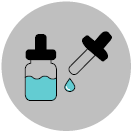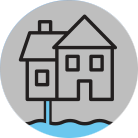DID YOU KNOW?
More than 50% of Maine homeowners have a private well, but less than half have been tested for harmful contaminants.
Radon is a naturally occurring gas that is produced by the breakdown of uranium in soil, bedrock,
and groundwater. It can be detected in air and water. A home may have high levels of radon in
the air but not the water and vice versa, so it’s important to test for both
regularly.
Did you know 1 in 5 Maine homes is affected by high levels of radon in water? You can’t
see, taste, or smell radon, but it poses a serious health risk. Exposure to radon is the number
one cause of lung cancer among non-smokers. Even if you don’t drink your well water, you
are still at risk if radon is present in your water. Showering, washing dishes, and doing
laundry releases radon gas into the air you and your family breathe.
When radon in water exceeds the established limit, a treatment system is required. The most
effective radon water treatment method is known as aeration. The fully integrated aeration
system creates bubbles in the water, which breaks the radon apart from the water and ventilates
it safely outside the home. The treated water in the system is now safe to use and delivered as
called for throughout your home.
Because water changes over time, it’s important to remember to have your well water tested annually, even after installing a treatment system, to be sure the original issues are controlled and to be aware of any new contaminants. Contact us to schedule your water
test or help you find the right solution for your home!

More than 50% of Maine homeowners have a private well, but less than half have been tested for harmful contaminants.

1 in 5 Maine homes is affected by high levels of radon in water. You can't see, taste, or smell radon, but it poses a serious health risk.